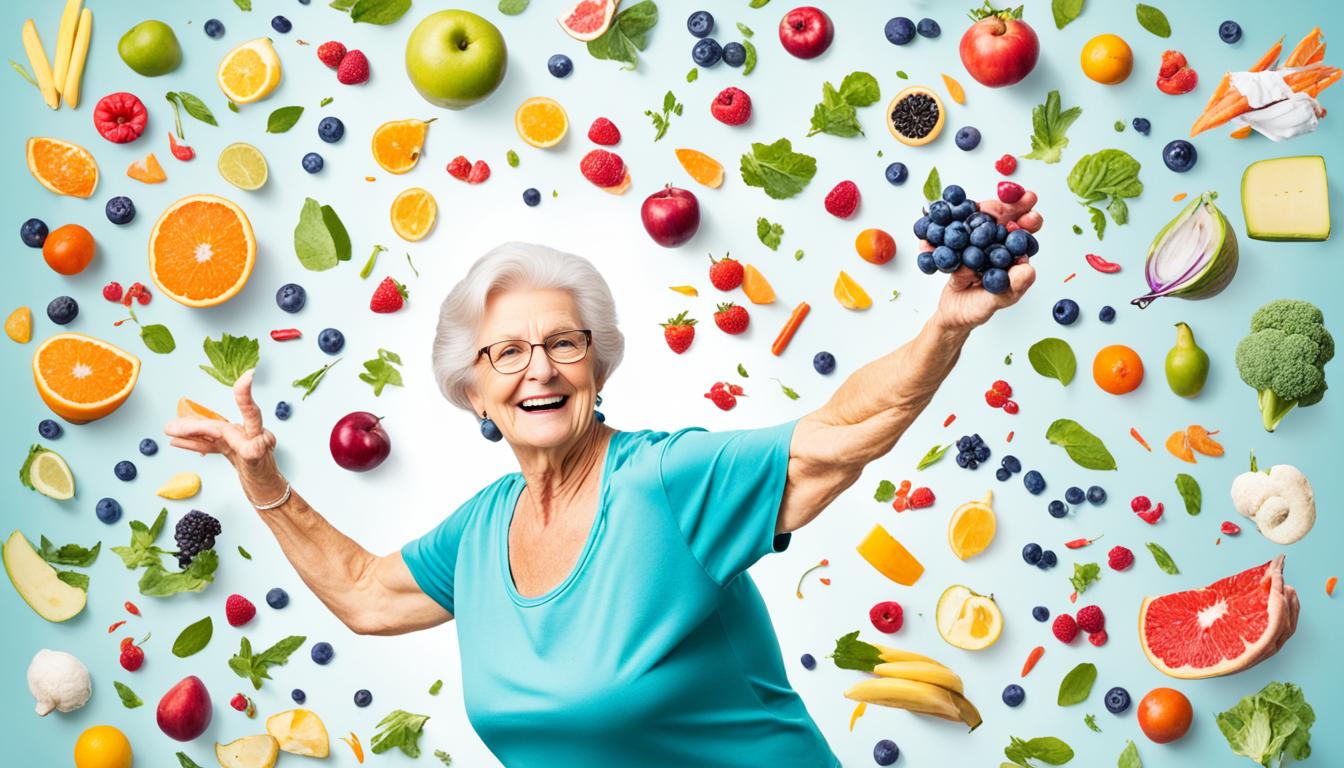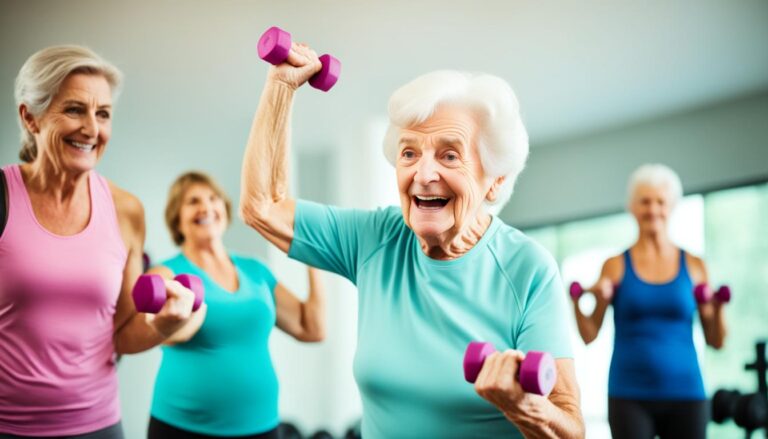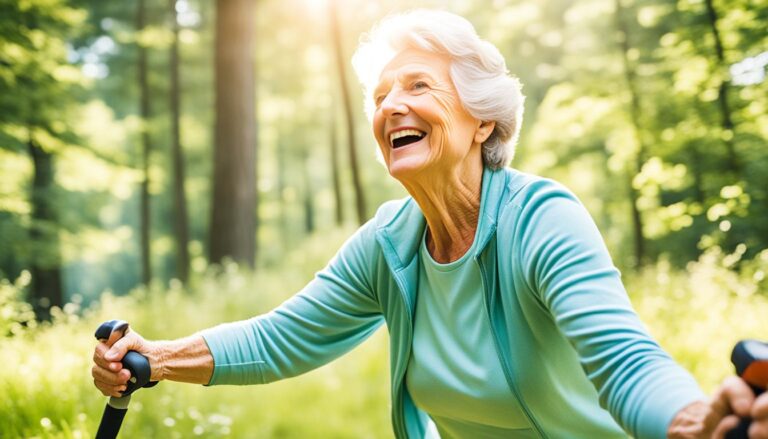Debunking Myths on Aging and Wellness Revealed
Have you ever wondered what it truly means to age well? Like many people, I’ve often wondered if there’s a secret to staying youthful and healthy as the years go by. It’s easy to get caught up in the misconceptions and myths that surround aging and wellness, but it’s time to challenge those beliefs and separate fact from fiction.
As I’ve journeyed through life and witnessed the experiences of my loved ones, I’ve come to realize that many of the ideas we have about aging are simply not true. We often believe that getting older automatically means a decline in health, a loss of mental sharpness, and a decrease in overall happiness. But what if I told you that these beliefs are just myths?
In this article, I will delve into the truth behind common myths about aging and wellness. By debunking these misconceptions, we can gain a better understanding of what it truly means to age well and maintain optimal wellness. Let’s challenge these beliefs and uncover the facts.
Key Takeaways:
- There are many misconceptions and myths surrounding aging and wellness.
- Getting older does not automatically mean a decline in health or happiness.
- By debunking these myths, we can gain a better understanding of what it truly means to age well.
- Let’s challenge these beliefs and uncover the facts about aging and wellness.
- Stay tuned as we explore the truth behind common myths and misconceptions.
The Fountain of Youth: Debunking the Myth
Many people have searched for the elusive “Fountain of Youth,” but the reality is that aging is a natural and inevitable process. Let’s explore why the idea of a magical potion to reverse aging is nothing more than a myth. We’ll uncover the truth behind aging and how we can embrace it with grace.
Contrary to popular belief, there is no magical solution or secret formula that can halt or reverse the aging process. Aging is a complex biological process that cannot be paused or ignored. It is a natural part of life, and instead of trying to fight against it, we should learn to accept and adapt to the changes that come with it.
Aging myths busted:
- Myth: Aging can be completely prevented or reversed.
- Myth: There is a magical “Fountain of Youth” that can restore youthfulness.
- Myth: Aging is solely determined by genetics and cannot be influenced.
- Myth: Aging only affects physical appearance and does not impact overall well-being.
- Myth: Aging is a negative and undesirable process that should be avoided.
By debunking these aging myths, we can gain a more realistic understanding of what it means to age and how we can prioritize our well-being as we go through this natural process. Aging is not something to be feared or denied but embraced as a unique stage of life.
“Aging is not lost youth but a new stage of opportunity and strength.” – Betty Friedan
Instead of focusing on reversing aging, we should focus on managing our physical, mental, and emotional well-being as we age. This includes maintaining a healthy lifestyle, engaging in regular exercise, eating a balanced diet, staying socially active, and taking care of our mental health. Aging gracefully is about embracing our individual journeys and finding joy in each stage of life.
| Wellness Myths | Wellness Truths |
|---|---|
| Aging can be reversed with a magic potion or treatment | Aging is a natural process that cannot be reversed |
| Age is solely determined by genetics | Lifestyle factors such as diet and exercise can influence how we age |
| Aging only affects physical appearance | Aging impacts physical, mental, and emotional well-being |
| Aging is a negative and undesirable process | Aging can bring wisdom, fulfillment, and new opportunities |
Aging Equals Declining Health: Separating Fact from Fiction
It’s commonly believed that aging automatically leads to declining health. However, this belief couldn’t be further from the truth. In this section, we’ll debunk the myth that aging and poor health go hand in hand. We’ll explore the factors that actually contribute to maintaining wellness as we age.
- Regular physical activity: Staying active and engaging in regular exercise can have numerous benefits for overall health and well-being. It helps to maintain muscle strength, flexibility, and cardiovascular health, reducing the risk of chronic diseases such as heart disease, diabetes, and certain cancers.
- Healthy diet: Proper nutrition plays a crucial role in maintaining optimal health as we age. A well-balanced diet rich in fruits, vegetables, whole grains, lean proteins, and healthy fats provides essential nutrients and antioxidants that support cellular health and immune function.
- Regular health screenings: Regular check-ups and health screenings are vital for early detection and prevention of illnesses. By staying proactive in monitoring our health, we can address any potential issues before they become serious.
Contrary to popular belief, certain age-related conditions are not inevitable. Take osteoporosis, for example. While it is true that bone density may decrease with age, lifestyle factors such as weight-bearing exercises and adequate calcium and vitamin D intake can help maintain bone health.
“Aging is not lost youth but a new stage of opportunity and strength.” – Betty Friedan
It’s important to challenge the misconceptions surrounding aging and recognize that many older adults lead fulfilling and active lives. By dispelling aging myths, we can make informed decisions about our health and well-being, leading to a better quality of life as we age.

| Myth | Fact |
|---|---|
| Aging means inevitable decline in health. | Healthy lifestyle choices can help maintain wellness as we age. |
| Older adults cannot exercise or engage in physical activity. | Regular physical activity is beneficial for older adults and supports overall health. |
| Memory loss and cognitive decline are unavoidable with age. | Many older adults maintain sharp mental abilities with proper care and stimulation. |
| Weight gain is inevitable as we get older. | Weight management is possible through healthy eating and regular exercise. |
The Myth of Physical Inactivity in Old Age
Contrary to popular belief, physical activity doesn’t have an expiration date. In fact, staying active is essential for overall wellness, regardless of age. Let’s debunk the myth that older adults should avoid physical exertion and explore the value of maintaining an active lifestyle.
Regular exercise offers numerous benefits for older adults, both physically and mentally. It helps maintain strength, flexibility, and balance, reducing the risk of falls and injuries. Physical activity also supports cardiovascular health and can lower the risk of chronic conditions such as heart disease, diabetes, and osteoporosis.
Engaging in regular exercise can have a positive impact on mental well-being as well. It can help reduce stress, anxiety, and depression, promoting better overall mental health. Exercise also enhances cognitive function and memory, keeping the mind sharp as we age.
“Physical fitness is not only one of the most important keys to a healthy body; it is the basis of dynamic and creative intellectual activity.” – John F. Kennedy
Older adults who embrace physical activity often experience an improved quality of life. From participating in low-impact activities like walking, swimming, or yoga to engaging in strength training or sports, there are numerous options available to suit individual abilities and preferences.
Remember, it’s never too late to start being physically active. It’s essential to consult with a healthcare professional before beginning any exercise program, especially if there are underlying health concerns or limitations. They can provide guidance and tailor a fitness plan to meet specific needs.
Embrace the power of physical activity and challenge the misconception that older adults should avoid exercise. By staying active, we can promote better physical and mental well-being, leading to a more fulfilling and vibrant life.
| Benefits of Physical Activity in Old Age |
|---|
| Improved strength, flexibility, and balance |
| Enhanced cardiovascular health |
| Reduced risk of chronic conditions |
| Reduced stress, anxiety, and depression |
| Enhanced cognitive function and memory |
| Improved quality of life |
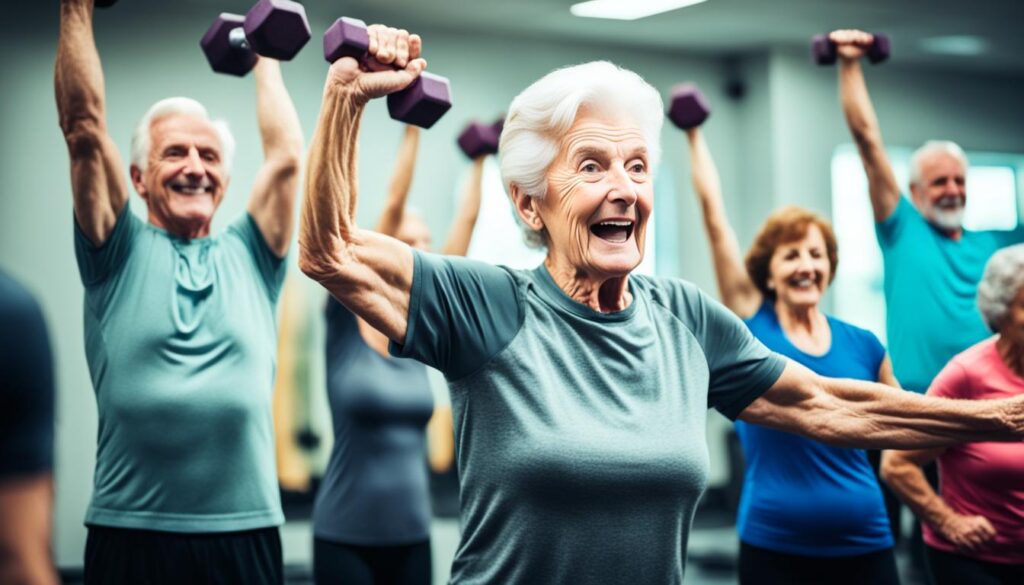
Debunking the “Senior Moments” Myth
It’s common to associate memory loss and cognitive decline with aging. However, this stereotype overlooks the fact that many older adults maintain sharp mental abilities. As we bust another aging myth, let’s challenge the misconception of “senior moments” and dive into strategies for maintaining cognitive function as we age.
Contrary to popular belief, aging does not automatically lead to a decline in mental capabilities. Research shows that cognitive abilities can be preserved and even improved with the right lifestyle choices and habits. It’s important to debunk this myth and ensure that we don’t underestimate the potential of older adults.
“Age is no barrier. It’s a limitation you put on your mind.” – Jackie Joyner-Kersee
Adopting a proactive approach to brain health can help us maintain cognitive function as we age. Here are some evidence-based strategies to consider:
- Engage in regular mental stimulation through activities like reading, puzzles, or learning new skills. This helps to keep our brains active and agile.
- Stay socially connected. Research suggests that regular social interaction can positively impact cognitive function.
- Eat a healthy diet rich in fruits, vegetables, whole grains, and omega-3 fatty acids. These nutrients support brain health and reduce the risk of cognitive decline.
- Get regular physical exercise. Physical activity promotes healthy blood flow to the brain and enhances cognitive function.
- Manage stress effectively. Chronic stress can have a negative impact on the brain, so it’s important to find healthy coping mechanisms to reduce stress levels.
By implementing these strategies, we can challenge the myth of “senior moments” and maintain optimal cognitive function as we age.
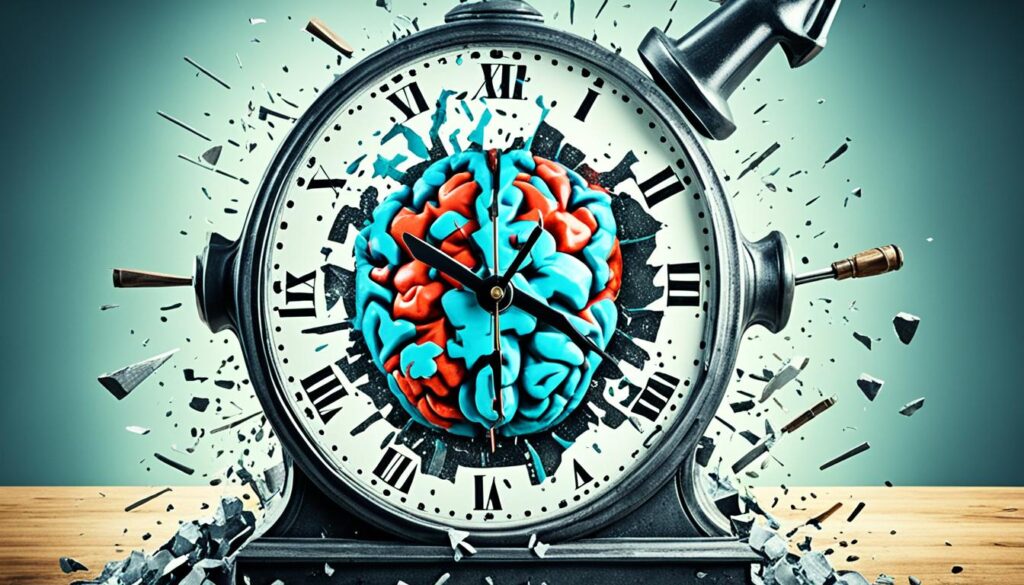
| Common Aging Myth | Debunked Reality |
|---|---|
| Older adults experience memory loss and cognitive decline | Many older adults maintain sharp mental abilities and can continue to learn and adapt. |
| Memory lapses are a natural part of aging | While forgetfulness can occur at any age, it is not an inevitable consequence of getting older. |
| Brain function inevitably declines with age | By adopting a brain-healthy lifestyle, cognitive function can be preserved and even improved. |
The Myth of Happiness Decline in Older Age
Society often portrays aging as a period of unhappiness and dissatisfaction. However, research tells us a different story. Contrary to popular belief, happiness does not decline as we grow older. In fact, many older adults report high levels of life satisfaction and overall well-being. The myth of happiness decline in older age stands debunked as we challenge these misconceptions and uncover the truth.
The Factors That Contribute to Happiness
It is essential to understand the factors that contribute to happiness in older age. While physical health and independence play crucial roles, there are various other aspects to consider:
- Relationships: Maintaining meaningful connections with friends, family, and social networks is vital for happiness. Engaging in social activities and fostering positive relationships can provide a sense of belonging and support.
- Engagement and Purpose: Having a sense of purpose and staying engaged in meaningful activities, such as pursuing hobbies, volunteering, or learning new skills, can enhance happiness and overall well-being.
- Mental and Emotional Well-being: Taking care of mental health, managing stress, and cultivating a positive mindset are essential for sustained happiness.
- Adaptability and Resilience: Older adults who can adapt to life changes and maintain resilience have a higher likelihood of experiencing happiness and fulfillment.
Research shows that as we age, our priorities shift, and we tend to focus more on the aspects of life that bring us joy and fulfillment. This change in perspective contributes to greater happiness and a better overall quality of life.
Highlighting the Benefits of Aging
Aging is often associated with negative stereotypes and misconceptions. However, it is crucial to challenge these beliefs and embrace the many benefits that come with growing older:
- Wisdom and Experience: With age comes a wealth of knowledge and life experience. Older adults can offer valuable insights and guidance to younger generations.
- Self-Acceptance and Confidence: As we age, we tend to become more comfortable in our own skin and develop a stronger sense of self-acceptance and confidence.
- Embracing New Opportunities: Aging allows us to explore new passions, interests, and pursuits. It can be a time of personal growth and discovery.
- Greater Perspective: Older adults often have a broader perspective on life, which enables them to approach challenges with wisdom and resilience.
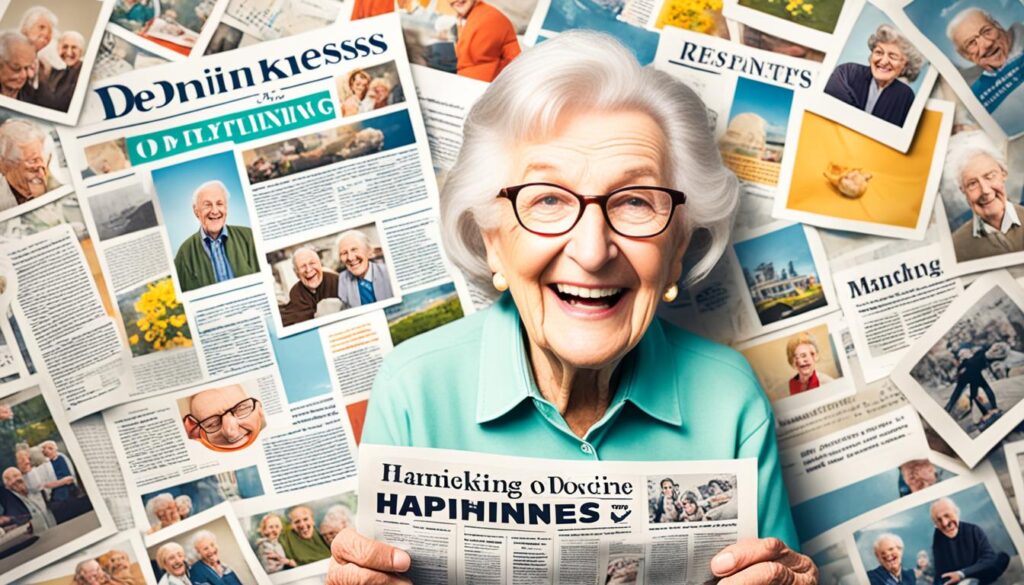
The image above showcases the joy and vibrancy that can be experienced in older age, challenging the myth of happiness decline.
Dispelling the Myth of Aging and Weight Gain
Contrary to popular belief, weight gain is not an unavoidable consequence of aging. In this section, we will debunk the myth that aging automatically leads to packing on the pounds. Let’s explore the factors that impact weight management and uncover the truth about maintaining a healthy weight throughout life.
The Truth About Aging and Weight
Many people assume that as we age, our metabolism slows down, leading to weight gain. While it is true that metabolism tends to decline with age, it is not the sole determining factor in weight gain. Other factors, such as hormonal changes and changes in body composition, also play a significant role.
“The belief that weight gain is inevitable with age is a misconception. By understanding the underlying factors and adopting healthy habits, it is possible to maintain a healthy weight at any age.”
The Role of Hormones
Hormonal changes that occur with age can impact weight management. For example, menopause in women is often associated with weight gain due to hormonal fluctuations. However, with adequate lifestyle modifications and a balanced diet, weight gain can be prevented or minimized.
Body Composition Changes
As we age, our bodies naturally undergo changes in muscle mass and fat distribution. This shift can result in a decrease in muscle mass and an increase in body fat. However, by incorporating regular exercise, including resistance training, we can mitigate these changes and maintain a healthy body composition.
Tips for Maintaining a Healthy Weight
Here are some practical tips to help you maintain a healthy weight as you age:
- Adopt a well-balanced diet that includes plenty of fruits, vegetables, whole grains, and lean proteins.
- Avoid excessive consumption of processed foods, sugary drinks, and high-calorie snacks.
- Stay physically active by incorporating regular exercise into your routine, including both cardiovascular and strength training exercises.
- Get enough sleep and manage stress levels, as lack of sleep and chronic stress can contribute to weight gain.
- Stay hydrated by drinking an adequate amount of water throughout the day.
Remember, maintaining a healthy weight is a lifelong journey that requires a balanced approach to nutrition, physical activity, and self-care.
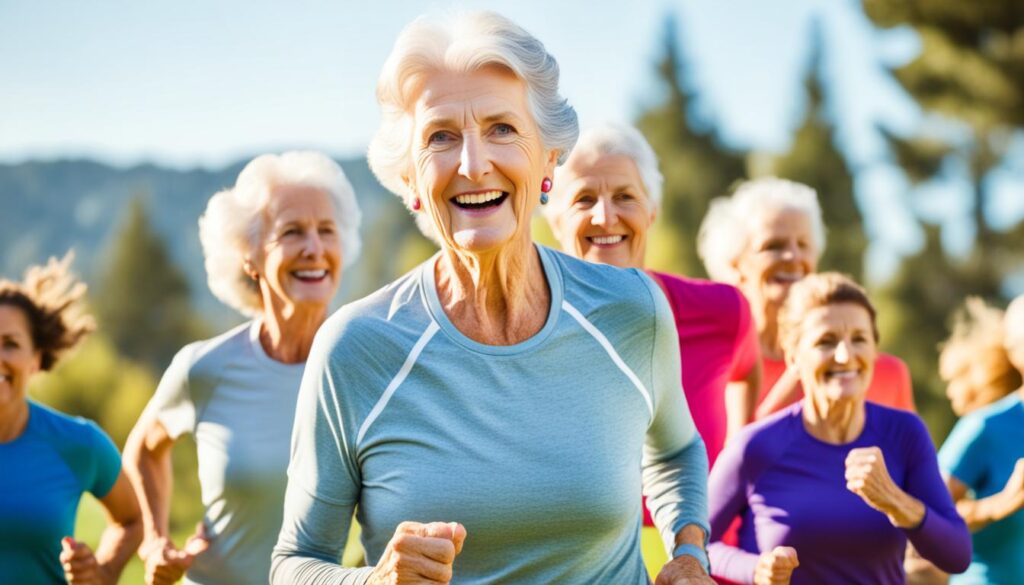
| Common Misconception | The Truth |
|---|---|
| Aging automatically leads to weight gain. | Weight gain is not inevitable with age. |
| The metabolism slows down significantly with age. | While metabolism may decline, it is not the sole determinant of weight gain. |
| Hormonal changes cause inevitable weight gain. | With lifestyle modifications, hormonal weight gain can be managed or minimized. |
| Body composition changes make weight management difficult. | Regular exercise, particularly strength training, can help maintain a healthy body composition. |
Debunking the Myth of Fragile Bones in Old Age
Osteoporosis and fragile bones are often associated with aging, but this myth can be debunked with the right knowledge and strategies. Contrary to popular belief, age alone does not determine bone health. In fact, there are several factors that contribute to maintaining strong bones as we age.
One of the key misconceptions about aging is that bone density inevitably decreases with time. While it is true that bone mass naturally declines with age, there are proactive steps we can take to minimize this decline and reduce the risk of fractures.
Understanding Osteoporosis
Osteoporosis is a condition characterized by low bone density and an increased susceptibility to fractures. It is more common in older adults, particularly women after menopause. However, it’s important to note that not all older individuals develop osteoporosis, and it is not an inevitable consequence of aging.
Factors such as genetics, hormonal changes, diet, physical activity, and lifestyle choices all play a role in bone health. By adopting a holistic approach, we can promote strong bones and reduce the risk of osteoporosis.
Strategies for Maintaining Bone Health
- 1. Calcium-rich diet: Consuming foods high in calcium, such as dairy products, leafy greens, and fortified foods, can help support bone health. Aim for the recommended daily intake of 1000-1200 mg of calcium.
- 2. Vitamin D: Adequate vitamin D levels are crucial for calcium absorption and bone health. Sun exposure and fortified foods can be sources of vitamin D, but supplements may also be necessary.
- 3. Regular weight-bearing exercise: Engaging in weight-bearing activities like walking, jogging, and strength training can help maintain bone density and strength.
- 4. Avoid smoking and excessive alcohol: Smoking and heavy alcohol consumption can negatively impact bone health. Quitting smoking and moderating alcohol intake can promote better bone health.
- 5. Speak with a healthcare professional: If you have concerns about your bone health, consult with your healthcare provider. They can assess your risk factors and recommend appropriate screening tests or treatments.
By implementing these strategies, we can defy the myth of fragile bones in old age and actively work towards maintaining strong and healthy bones.
Foods High in Calcium
| Food | Calcium Content (per 100g) |
|---|---|
| Yogurt | 110 mg |
| Cheese (Cheddar) | 721 mg |
| Kale | 150 mg |
| Sardines (with bones) | 382 mg |
| Milk | 125 mg |
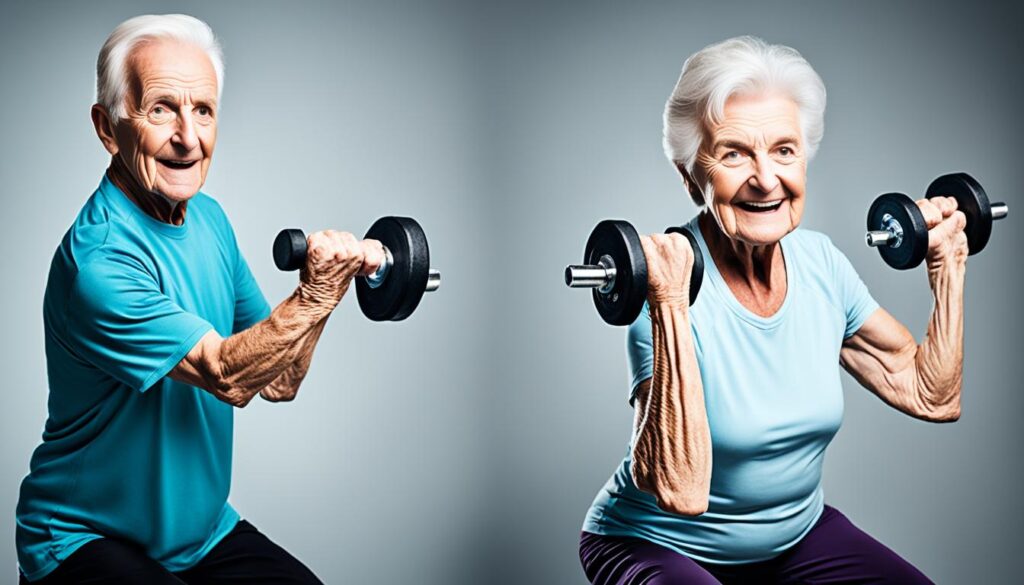
Uncovering the Truth Behind Aging Skin Myths
The beauty industry often perpetuates countless myths about aging skin, leading individuals to develop unnecessary insecurities and pursue ineffective treatments. In this section, I will debunk these misconceptions and shed light on the truth behind the changes our skin undergoes as we age. It is time for us to embrace our natural beauty and gain a deeper understanding of what truly contributes to healthy and vibrant skin.
One prevailing myth is that aging skin is synonymous with inevitable wrinkles and fine lines. While it is true that our skin changes over time, these changes do not have to signify an undesirable appearance. Our skin’s natural aging process is influenced by factors such as genetics, sun exposure, and lifestyle choices.
“The myth that aging automatically equates to the decline of healthy skin not only perpetuates unnecessary anxiety but also promotes the sale of countless skincare products targeting these concerns. It is essential to demystify these misconceptions and prioritize a well-rounded approach to skincare.”
The truth:
-
Collagen and elastin: Contrary to what many believe, the decline of collagen and elastin production is not solely responsible for wrinkles and sagging skin. While it is true that these proteins naturally diminish over time, lifestyle factors such as sun exposure, smoking, and poor nutrition can accelerate their deterioration. Additionally, external factors like pollution and harsh skincare practices can contribute to premature aging.
-
Moisture and hydration: Another common misconception is that aging skin is inherently dry and dehydrated. While it is true that our skin’s natural moisture retention declines as we age, this can be mitigated with a proper skincare routine that includes hydrating ingredients and a balanced diet rich in antioxidants and healthy fats. Adequate hydration from both inside and outside can significantly improve the appearance and texture of our skin.
-
Individualized skincare: There is no one-size-fits-all solution when it comes to skincare. Each person’s skin is unique, and it requires personalized attention and products that cater to its specific needs. Consulting a dermatologist or skincare professional can provide valuable guidance on developing a tailored routine that addresses specific concerns and optimizes skin health.
By dispelling the myths surrounding aging skin, we can make informed decisions about our skincare routine and focus on strategies that genuinely contribute to healthier and more radiant skin. Let us embrace the beauty that comes with age and adopt a holistic approach to skincare that nurtures both our inner and outer well-being.

Conclusion
In conclusion, debunking common myths about aging and wellness is crucial for understanding the true nature of getting older and maintaining optimal well-being. By challenging these misconceptions, we can live healthier, more enlightened lives. Let’s continue to seek out knowledge and question societal beliefs about aging and wellness.
FAQ
What are some common myths about aging and wellness?
There are several common myths about aging and wellness, including the belief that aging automatically leads to declining health, physical activity becomes less important as we age, and memory loss is a normal part of getting older.
Is there really a “Fountain of Youth”?
No, the idea of a magical potion or solution to reverse aging is simply a myth. Aging is a natural and inevitable process that cannot be stopped or reversed.
Does aging automatically mean declining health?
No, aging does not automatically equate to declining health. While certain health conditions may be more common as we age, there are many factors that contribute to maintaining wellness well into old age.
Should older adults avoid physical activity?
No, physical activity is beneficial at any age. It helps maintain physical and mental well-being, improves strength and flexibility, and reduces the risk of chronic diseases.
Do seniors experience frequent memory lapses?
Memory loss and cognitive decline are not inevitable with age. Many older adults maintain sharp mental abilities, and there are strategies to help preserve cognitive function as we age.
Is happiness in decline during older age?
No, happiness does not decline as we age. Research shows that older adults often report higher levels of life satisfaction and well-being compared to younger age groups.
Does aging always lead to weight gain?
No, weight gain is not unavoidable as we age. It is influenced by a combination of factors including metabolism, activity level, and dietary choices.
Are older adults prone to fragile bones?
While osteoporosis and fragile bones can be more common among older adults, this myth can be debunked with proper preventive measures, such as a healthy diet and regular exercise.
Does our skin inevitably deteriorate with age?
Aging skin is a natural part of the aging process, but there are ways to maintain skin health and minimize the effects of aging, such as using sun protection, staying hydrated, and following a skincare routine.
Why is it important to debunk myths about aging and wellness?
Debunking myths about aging and wellness is crucial for gaining a better understanding of the aging process and maintaining optimal well-being. Challenging these misconceptions allows us to make informed choices and lead healthier lives.

